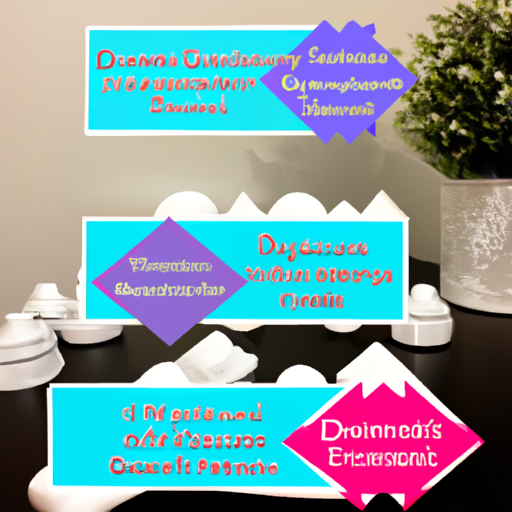-
Table of Contents
- Introduction
- The Pros and Cons of Diffusing Essential Oils
- Understanding the Side Effects of Diffusing Essential Oils
- How to Minimize the Side Effects of Diffusing Essential Oils
- What to Do if You Experience Side Effects from Diffusing Essential Oils
- How to Choose the Right Essential Oils for Diffusing
- The Benefits of Diffusing Essential Oils
- How to Create a Safe Environment When Diffusing Essential Oils
- Q&A
- Conclusion
Introduction
Essential oils are a popular natural remedy for a variety of ailments, and diffusing them is a popular way to enjoy their benefits. However, it is important to be aware of the potential side effects of diffusing essential oils, as some people may experience adverse reactions. In this article, we will discuss the potential side effects of diffusing essential oils, as well as how to reduce the risk of experiencing them.
The Pros and Cons of Diffusing Essential Oils
The use of essential oils has become increasingly popular in recent years, with many people turning to them for their therapeutic and medicinal benefits. Diffusing essential oils is one of the most common ways to enjoy their benefits, but it is important to understand the pros and cons of this method before deciding if it is right for you.
Pros
One of the main advantages of diffusing essential oils is that it is a safe and effective way to enjoy their therapeutic benefits. Diffusing essential oils can help to reduce stress and anxiety, improve sleep, and even boost your mood. It can also help to purify the air in your home, as many essential oils have antibacterial and antifungal properties.
Another benefit of diffusing essential oils is that it is a relatively inexpensive way to enjoy their benefits. All you need is an essential oil diffuser and a few drops of your favorite essential oil.
Cons
One of the main drawbacks of diffusing essential oils is that it can be difficult to control the amount of essential oil that is released into the air. If too much essential oil is released, it can be overwhelming and even cause headaches or nausea.
In addition, some essential oils can be irritating to the skin, eyes, and respiratory system. It is important to be aware of this and take the necessary precautions when diffusing essential oils.
Finally, it is important to note that diffusing essential oils is not a substitute for medical treatment. If you are experiencing any health issues, it is important to consult with your doctor before using essential oils.
In conclusion, diffusing essential oils can be a great way to enjoy their therapeutic benefits. However, it is important to be aware of the potential risks and take the necessary precautions. If you decide to use essential oils, make sure to do your research and use them safely.
Understanding the Side Effects of Diffusing Essential Oils
Diffusing essential oils is a popular way to enjoy the therapeutic benefits of aromatherapy. However, it is important to understand the potential side effects of diffusing essential oils before using them.
The most common side effect of diffusing essential oils is irritation of the skin, eyes, and mucous membranes. This can occur if the oil is applied directly to the skin or if it is inhaled in large amounts. If you experience any irritation, stop using the oil immediately and seek medical attention if necessary.
Another potential side effect of diffusing essential oils is allergic reactions. Allergic reactions can range from mild to severe and can include skin rashes, hives, and difficulty breathing. If you experience any of these symptoms, stop using the oil immediately and seek medical attention.
In addition, some essential oils can be toxic if ingested. If you accidentally ingest an essential oil, seek medical attention immediately.
Finally, some essential oils can be irritating to the respiratory system. If you experience any difficulty breathing, coughing, or wheezing, stop using the oil immediately and seek medical attention.
In conclusion, diffusing essential oils can be a great way to enjoy the therapeutic benefits of aromatherapy. However, it is important to understand the potential side effects of diffusing essential oils before using them. If you experience any irritation, allergic reactions, or difficulty breathing, stop using the oil immediately and seek medical attention.
How to Minimize the Side Effects of Diffusing Essential Oils
Diffusing essential oils is a popular way to enjoy the therapeutic benefits of aromatherapy. However, it is important to be aware of the potential side effects of diffusing essential oils, and to take steps to minimize them.
First, it is important to use only high-quality essential oils. Low-quality oils may contain impurities that can cause adverse reactions. It is also important to use the correct dilution ratio when diffusing essential oils. Generally, a ratio of 1-2 drops of essential oil per 1-2 teaspoons of carrier oil is recommended.
Second, it is important to be aware of any potential allergies or sensitivities to essential oils. If you have any known allergies or sensitivities, it is best to avoid diffusing essential oils altogether. If you are unsure, it is best to start with a small amount and observe any reactions.
Third, it is important to be aware of the potential for skin irritation. Essential oils can be irritating to the skin, so it is important to avoid direct contact with the skin. If you are using a diffuser necklace, it is important to clean the necklace regularly to avoid any buildup of essential oils.
Finally, it is important to be aware of the potential for adverse reactions in children and pets. Essential oils can be toxic to children and pets, so it is important to keep them away from any diffused essential oils.
By following these steps, you can minimize the potential side effects of diffusing essential oils and enjoy the therapeutic benefits of aromatherapy.
What to Do if You Experience Side Effects from Diffusing Essential Oils
If you experience any side effects from diffusing essential oils, it is important to take the necessary steps to ensure your safety and well-being. Here are some tips on what to do if you experience side effects from diffusing essential oils:
1. Stop diffusing the essential oil immediately. If you are experiencing any side effects, it is important to stop using the essential oil right away.
2. Seek medical attention. If you are experiencing any serious side effects, such as difficulty breathing, dizziness, or nausea, it is important to seek medical attention right away.
3. Contact the manufacturer. If you are experiencing any side effects, it is important to contact the manufacturer of the essential oil to report the issue.
4. Reduce the amount of essential oil used. If you are experiencing any side effects, it is important to reduce the amount of essential oil used in your diffuser.
5. Use a different essential oil. If you are experiencing any side effects, it is important to switch to a different essential oil.
6. Use a different diffuser. If you are experiencing any side effects, it is important to switch to a different diffuser.
7. Use a different method of application. If you are experiencing any side effects, it is important to switch to a different method of application, such as topical application or inhalation.
By following these tips, you can ensure your safety and well-being when diffusing essential oils.
How to Choose the Right Essential Oils for Diffusing
When it comes to diffusing essential oils, it is important to choose the right ones for the desired effect. Essential oils are highly concentrated and can have powerful effects on the body and mind, so it is important to be mindful of the oils you choose. Here are some tips to help you choose the right essential oils for diffusing.
First, consider the desired effect. Different essential oils have different properties and can be used to achieve different effects. For example, some oils are calming and can help reduce stress and anxiety, while others are energizing and can help boost focus and productivity. Consider what effect you are looking for and choose oils that will help you achieve it.
Second, consider the scent. Different essential oils have different scents, so it is important to choose oils that you enjoy. If you don’t like the scent of a particular oil, you won’t want to diffuse it.
Third, consider the safety of the oils. Some essential oils can be irritating to the skin or respiratory system, so it is important to research the safety of the oils you are considering.
Finally, consider the quality of the oils. Not all essential oils are created equal, so it is important to choose oils that are of high quality. Look for oils that are organic, pure, and free of additives.
By following these tips, you can choose the right essential oils for diffusing and enjoy the benefits they can provide.
The Benefits of Diffusing Essential Oils
Diffusing essential oils is a popular and effective way to enjoy the therapeutic benefits of aromatherapy. Essential oils are highly concentrated plant extracts that are known for their healing properties. When diffused, essential oils can help to reduce stress, improve mood, and promote relaxation.
One of the primary benefits of diffusing essential oils is that it can help to reduce stress and anxiety. The aroma of essential oils can help to create a calming atmosphere, which can help to reduce feelings of stress and anxiety. Diffusing essential oils can also help to improve mood and promote relaxation. The aroma of essential oils can help to create a sense of calm and relaxation, which can help to reduce feelings of depression and anxiety.
In addition to reducing stress and anxiety, diffusing essential oils can also help to improve sleep. The aroma of essential oils can help to create a calming atmosphere, which can help to promote restful sleep. Diffusing essential oils can also help to reduce symptoms of insomnia, such as difficulty falling asleep and waking up during the night.
Diffusing essential oils can also help to improve air quality. Essential oils can help to purify the air by removing airborne bacteria and other contaminants. This can help to reduce the risk of respiratory illnesses, such as colds and flu.
Finally, diffusing essential oils can help to improve mental clarity and focus. The aroma of essential oils can help to stimulate the brain, which can help to improve concentration and focus. This can be especially beneficial for those who are studying or working on complex tasks.
In conclusion, diffusing essential oils can provide a variety of therapeutic benefits. Diffusing essential oils can help to reduce stress and anxiety, improve mood, promote relaxation, improve sleep, purify the air, and improve mental clarity and focus. For these reasons, diffusing essential oils is an effective and popular way to enjoy the therapeutic benefits of aromatherapy.
How to Create a Safe Environment When Diffusing Essential Oils
Creating a safe environment when diffusing essential oils is important for both your health and the health of those around you. Here are some tips to help you create a safe environment when diffusing essential oils:
1. Ensure proper ventilation: Make sure the room you are diffusing in is well-ventilated. Open windows and doors to allow fresh air to circulate.
2. Use the right diffuser: Choose a diffuser that is designed for essential oils and is of good quality. Make sure it is designed to disperse the oil into the air in a safe and effective manner.
3. Follow the manufacturer’s instructions: Read the instructions that come with your diffuser and follow them carefully. This will help ensure that you are using the diffuser correctly and safely.
4. Use the right amount of oil: Use only the recommended amount of essential oil for your diffuser. Too much oil can be overwhelming and can cause irritation.
5. Monitor the area: Monitor the area where you are diffusing to make sure that the scent is not too strong or overwhelming. If it is, reduce the amount of oil or turn off the diffuser.
6. Keep out of reach of children and pets: Essential oils can be toxic if ingested, so make sure to keep the diffuser and essential oils out of reach of children and pets.
By following these tips, you can create a safe environment when diffusing essential oils.
Q&A
1. What are the most common side effects of diffusing essential oils?
The most common side effects of diffusing essential oils are headaches, nausea, dizziness, and skin irritation.
2. Are there any long-term side effects of diffusing essential oils?
There are no known long-term side effects of diffusing essential oils, however, it is important to use caution when diffusing essential oils as some people may be sensitive to certain oils.
3. Is it safe to diffuse essential oils around children and pets?
It is generally safe to diffuse essential oils around children and pets, however, it is important to use caution and to research the specific oil you are using to ensure it is safe for children and pets.
4. Can diffusing essential oils cause respiratory problems?
Diffusing essential oils can cause respiratory problems in some people, especially those with asthma or other respiratory conditions. It is important to use caution when diffusing essential oils and to research the specific oil you are using to ensure it is safe for your respiratory system.
5. Can diffusing essential oils cause skin irritation?
Yes, diffusing essential oils can cause skin irritation in some people. It is important to use caution when diffusing essential oils and to research the specific oil you are using to ensure it is safe for your skin.
6. Can diffusing essential oils cause headaches?
Yes, diffusing essential oils can cause headaches in some people. It is important to use caution when diffusing essential oils and to research the specific oil you are using to ensure it is safe for your body.
7. Are there any other side effects of diffusing essential oils?
Other possible side effects of diffusing essential oils include nausea, dizziness, and eye irritation. It is important to use caution when diffusing essential oils and to research the specific oil you are using to ensure it is safe for your body.
Conclusion
In conclusion, diffusing essential oils can be a great way to enjoy the benefits of aromatherapy, but it is important to be aware of the potential side effects. Some of the most common side effects include headaches, nausea, dizziness, and skin irritation. It is important to use essential oils safely and to consult with a healthcare professional if any of these side effects occur.




